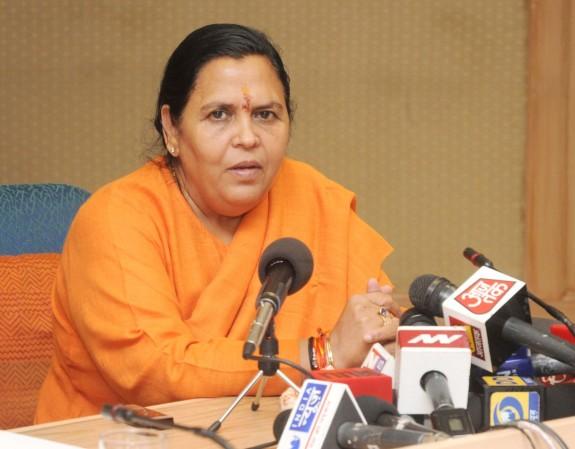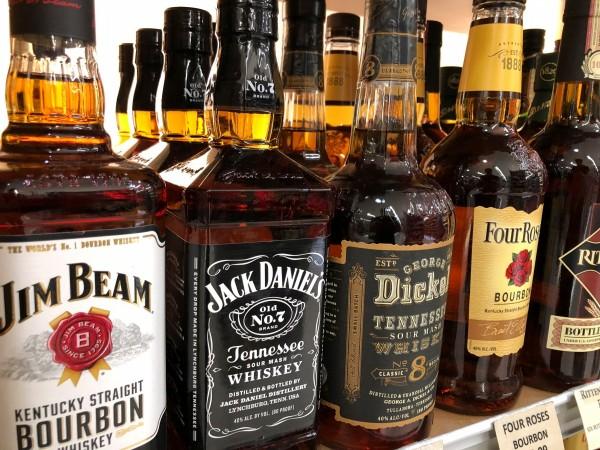Amid a new controversy triggered over liquor policy in Karnataka, senior BJP leader and former Union Minister Chief Minister Uma Bharati on Thursday appealed to the party's national president JP Nadda to ensure a ban on alcohol in every BJP-ruled state.
In a series of tweets, Bharti listed several reasons why the prohibition should be imposed on an urgent basis.
"I am making a public appeal to our party president JP Nadda through this tweet that wherever we have a BJP government, we should prepare for a complete prohibition in those states," she tweeted in Hindi.

Row over new liquor stores
Bharti's appeal has come days after Madhya Pradesh state Home minister Narottam Mishra's statement on opening new liquor stores sparked a row on liquor policies.
Appreciating MP Chief Minister Shivraj Singh Chouhan's move to delay the decision on the issue, she tweeted that the "Government has not yet decided about increasing the number of liquor shops in Madhya Pradesh. This statement of Shivraj Singh Chouhan is a welcome step."
Chouhan has reportedly said that no new liquor shops had been set up during his 10 years' tenure as chief minister; in fact, their number had reduced. However, it is yet to be decided whether to open new liquor shops because whatever be the move it has to be in favour of the people, he added.
Furthermore, Bharti then went on highlighting the positive impact of alcohol prohibition. "At the time of the lockdown due to coronavirus, there was almost a state of prohibition, it is clear from the fact that people died from other causes and coronavirus but no one died due to drinking alcohol," she argued.
Citing recent examples of hooch tragedy
In her tweets, the BJP leader also highlighted the recent cases of people dying in Uttar Pradesh and Madhya Pradesh due to drinking spurious liquor.
"Recently in Uttar Pradesh and Madhya Pradesh, a large number of people died due to drinking alcohol. Most of the road accidents are caused by the driver's drinking. It is surprising that liquor is the messenger of death, yet greed and pressure from the liquor mafia do not allow for prohibition," she said.
Bharti said that political parties are under immense pressure to win elections, but the BJP's victory in Bihar assembly polls proves that the votes of women went to Chief Minister Nitish Kumar due to his policy of total prohibition.
![[Representational Image] liquor ban india, highway liquor ban](https://data1.ibtimes.co.in/en/full/641255/liquor-ban-india-highway-liquor-ban.jpg?h=450&l=50&t=40)
In 2016, Kumar declared Bihar a dry state, following the footsteps of Gujarat, Mizoram, Nagaland, and Lakshadeep. Even though the domestic violence rate showed a sharp decline through the years, data of National Crime Records Bureau (NCRB), released last October, stated that the prohibition at the same time had unintended consequences, including the birth of a parallel economy of illicit liquor trade as the state is losing out on revenue from alcohol sales.
It was found that bootleggers were selling alcohol at a higher price, pushing the poor towards cheap drugs and hooch.
Emergence of licence-free and wider establishments
First, it should be noted that there is no national law in the country to ban alcohol consumption since it is in the State List and it depends on the individual state governments on how and what measures they adopt to reduce consumption of alcohol in their states.
Now, it is obvious that banning alcohol would heavily impact the revenue generation of the state and that is when licence free sale of liquor comes into being.

Karnataka Example
Livemint revealed that Karnataka had generated revenue to the tune of ₹2,460 crore from liquor sales in June last year, higher than in May. The funds proved crucial for the state battered by the coronavirus pandemic that had hit revenue from other sources owing to lockdown and sluggish economy.
The revenue in June was higher compared to the ₹1,400 crore marked a month before owing to licence fee and a wider range of establishments, such as restaurants, bars, and even microbreweries, being allowed to sell liquor.
Despite restricting liquor sales as part of the lockdown announced on March 24, the Centre had reopened liquor sales outside containment zones on May 4, bringing in much-needed revenues to states in meeting their fiscal crunch.








